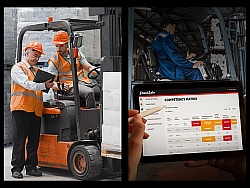Refresher Training and Verification of Competency – What’s the Difference?
19 Sep 2023
At Axiom Training we’re proud to offer a full range of workplace safety, driver licensing and industry training.
We deliver this training in various ways too, to meet the needs of businesses – courses run at our site or yours, refreshers, verification of competency and online training.
We’ll work with you to understand your requirements, then can recommend the best training solution for you and your business. When it comes to ‘refresher training’ and ‘verification of competency’, we appreciate there can be some confusions. Here we explain both and when to use each type.
Refresher Training
Refresher training is training that refreshes the essential knowledge and skill of the trainee after the initial full training and assessment (normally unit standard training and assessment) has taken place. Refresher training is used to confirm and increase the trainee’s knowledge and update them on any changes within that field of expertise.
While refresher training may be based on a unit standard, the trainee is not refreshing the unit standard as refresher training does not cover all the requirements of the unit standard only the essential knowledge/skills.
Some unit standards are required to be 'refreshed' by law or business best practice recommendations, for example Forklift and First Aid are recommended refresher subjects (three and two years respectively), where the transportation of Dangerous Goods is a legal requirement (every five years).
Most other high-risk disciplines are simply recommended due to their risk, this is a generally accepted practice by industry to ensure staff remain current and reduce the likelihood of bad habits becoming the actual practice, for example crane, confined space and working at height.
Please note that in these cases refresher training cannot be enforced but is strongly recommended as part of ongoing risk mitigation under the Health and Safety at Work Act which requires risk to be managed as far as what is reasonably practicable; refresher training is a clear measure that reduces risk.
Whether industry best practice or not, the PCBU and employers should be following recommended refresher dates to ensure they are managing and reducing risk to their workers.
Refresher training require less time than a unit standard course as it is expected trainees are coming into the course with prior knowledge (the unit standard), for example, the full Working at Heights course takes 16 hours whereas Refresher course takes 8 hours as it is mostly practical based.
Verification of Competency
Verification of Competency (VOC) is a method of assessment used to demonstrate workers’ knowledge and skills to operate equipment, machinery and/or undertake an industry-specific task. Assessing for Verification of Competency enables employers to confirm that their workers are competent in their skills and using the equipment.
Verification of Competency is a relatively new way of thinking for industry. Many workers are constantly applying their skills at work therefore there is a greater likelihood of them retaining the majority of required skills and knowledge against their original training and assessment (eg a unit standard or standards).
In this case they do not need to re-train and can simply perform a Verification of Competency against industry safe working practices and workplace procedures whilst performing a task that they are carrying out in their workplace.
The worker does not receive any further formal training to their current knowledge and skill or any formal updates/changes within the field they are operating in. A VoC will take approximately 15 mins per worker (allow half an hour for each, this allowing the assessor to give feedback and to move onto the next worker).
The benefit to the employer being less down time than a worker attending refresher training. The benefit to the worker is they are often more at ease as they are in their own environment completing a usual workplace task/activity and outside of the formal assessment situation. If a worker does not meet the requirements of a VoC Axiom Training would then recommend refresher training.
Do I need refresher training or VOC?
Well, it depends!
Refresher training is suitable:
- Where refresher is mandatory or recommended as business best practice – transportation of dangerous goods, forklift and firs aid.
- Where workers are not constantly applying their skills in a work context, Axiom Training would recommend refreshing the course. This allows for the candidate to retrain, as a large amount of the core knowledge and skills can be forgotten if not used enough in day-to-day work activities.
- If when carrying out an assessment, a worker does not meet the requirements of a VOC, we’d then recommend refresher training.
VOC is suitable:
- Where it’s a specialised piece of machinery/equipment that is not covered within a unit standard, Axiom Training can train the workers and then return to complete VOC’s after a period of time.
- Where refresher training is being completed, however the period of time is for example, every three years, a VOC would be recommended in between this period.
- As a preemployment check.
- As an ACC Back to Work check.
We understand that it can be difficult to determine what type of training would be best for your workforce, hopefully this information helps with your decision making.
However, please contact us directly to learn more and understand what training would be best for your business and workers.